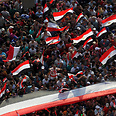
Egyptian President Mohamed Morsi's national security adviser said a military coup was underway on Wednesday after an army deadline for the Islamist leader to yield to street protests passed without any agreement.
"For the sake of Egypt and for historical accuracy, let's call what is happening by its real name: military coup," national security adviser Essam El-Haddad said in a statement, warning of "considerable bloodshed."
Related stories:
Army troops backed by armor and including commandos have deployed across much of the Egyptian capital, surrounding protests by the president's supporters, and at key facilities and major intersections.
Associated Press reporters in various part of Cairo say the troops, backed by armored personnel carriers and in full combat gear, have deployed on strategic bridges and near protest sites by supporters of embattled President Morsi.
The deployment is part of a move by the military to tighten its control of key institutions Wednesday, slapping a travel ban on Morsi and top allies in preparation for an almost certain push to remove the Islamist president with the expiration of an afternoon deadline.
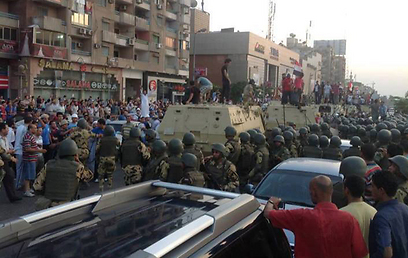
Army vehicles in Cairo
A presidential aide said Morsi was working at a Republican Guard barracks in a Cairo suburb, near to his office, and had chosen to stay there. Other close advisers were allowed to leave the compound after the 5:30 pm (1500 GMT) deadline expired.
The aide, Yasser Haddara, a communications adviser, said it was unclear whether Morsi was free to return to the palace where he spent the previous night. His message to supporters was to resist the "military coup" peacefully and not use violence against troops, police or other Egyptians.
Egypt's armed forces and Morsi refused to back down as the deadline for a military takeover passed with rival demonstrators out in force in the streets of Cairo.
Military chiefs, vowing to restore order in a country racked by protests over Morsi's Islamist policies, issued a call to battle in a statement headlined "The Final Hours." They said they were willing to shed blood against "terrorists and fools" after Morsi refused to give up his elected office.
Armored vehicles took up position outside the state broadcasting headquarters on the Nile River bank, where soldiers patrolled the corridors and non-essential staff were sent home. But there was no other immediate sign of military action to remove the Muslim Brotherhood president.
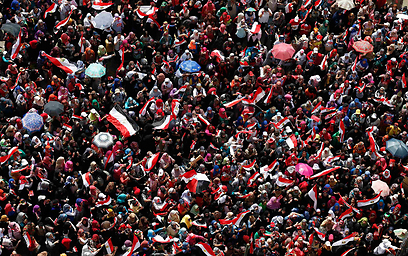
Tahrir Square (Photo: Reuters)
In a last-ditch statement a few minutes before the deadline expired, Morsi's office said a coalition government could be part of an initiative to overcome a political crisis. But opposition parties refused to negotiate with him and met instead with the commander of the armed forces.
As the ultimatum expired, thousands of anti-Morsi protesters in Tahrir Square in central Cairo let off fireworks, cheered and waved Egyptian flags in celebration.
There was no immediate word from the armed forces, and a spokesman said no fixed time had been set for a statement. Egyptian blogger Su Zee tweeted: "And in typical Egyptian fashion, #egypt is late for its own coup."
The Arab world's most populous nation has remained in turmoil since the fall of Hosni Mubarak as Arab Spring uprisings took hold in early 2011, arousing concern among allies in the West and in Israel, with which Egypt has a 1979 peace treaty.
US oil prices rose to a 14-month high above $100 a barrel partly on fears that unrest in Egypt could destabilize the Middle East and lead to supply disruption.
Less than three hours before the deadline for Morsi to agree to share power or make way for an army-imposed solution, the president's spokesman said it was better that he die in defense of democracy than be blamed by history.
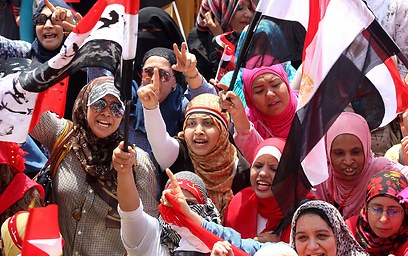
Photo: EPA
"It is better for a president, who would otherwise be returning Egypt to the days of dictatorship, from which God and the will of the people has saved us, to die standing like a tree," spokesman Ayman Ali said, "Rather than be condemned by history and future generations for throwing away the hopes of Egyptians for establishing a democratic life."
Yet despite Islamist talk of martyrdom and warnings of civil war, the dominant mood in Cairo streets was one of elation rather than foreboding.
Earlier, in an emotional, rambling midnight television address, Morsi said he was democratically elected and would stay in office to uphold the constitutional order, declaring: "The price of preserving legitimacy is my life."
Liberal opponents said it showed he had "lost his mind".
The official spokesman of the Muslim Brotherhood movement said supporters were willing to become martyrs to defend Morsi.
"There is only one thing we can do: we will stand in between the tanks and the president," Gehad El-Haddad told Reuters at the movement's protest encampment in a Cairo suburb that houses many military installations and is near the presidential palace.
"We will not allow the will of the Egyptian people to be bullied again by the military machine."
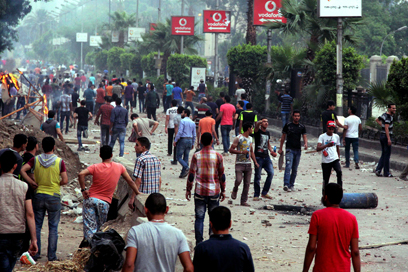
Clashes between Morsi opponents, supporters (Photo: AFP)
Armed forces commander General Abdel Fattah al-Sisi was meeting the main liberal opposition leader, Nobel peace laureate Mohamed ElBaradei, the top Muslim and Christian religious authorities and leaders of smaller Islamist parties and of the youth protest movement that led the anti-Morsi protests, the military said.
The Brotherhood's political arm, the Freedom and Justice Party, refused an invitation to meet Sisi, saying it only recognized the elected president.
The Egypt25 television station owned and run by the Brotherhood was continuing to broadcast live split-screen coverage of pro-Morsi demonstrations. The biggest was in a Cairo suburb where tens of thousands of protesters displayed posters of the president and cheered Islamist speakers.
Egyptians call for Morsi's resignation in Cairo subway
The state-run Al-Ahram newspaper said Morsi was expected to either step down or be removed from office and the army would set up a three-member presidential council to be chaired by the head of the Supreme Constitutional Court.
A military source said he expected the army to first call political, social and economic figures and youth activists for talks on its draft roadmap for the country's future.
At least 16 people, mostly supporters of the president, were killed and about 200 wounded when gunmen opened fire overnight on pro-Morsi demonstrators at Cairo University campus.
The Muslim Brotherhood accused uniformed police of the shooting. The Interior Ministry said it was investigating and the governor of Giza province, where the clash occurred, submitted his resignation.
Central Cairo was quiet by day. Many stores were shuttered and traffic unusually light. The stock market index recovered losses to close just 0.3% lower on hopes of a rapid solution to the crisis.
The Egyptian pound weakened against the dollar at a currency auction, and banks closed early, before the army deadline.
For the first time in many months, uniformed police were back patrolling the streets, and the Interior Ministry said in a statement it would "confront all forms of violence."
"I could tell that the police are back with their full power on the streets like the old days before the Jan. 25 revolution," said Amir Aly, 25, a protester outside the presidential palace.
Military sources told Reuters the army had drafted a plan to sideline Morsi, suspend the constitution and dissolve the Islamist-dominated upper house of parliament.
Coordinated with political leaders, an interim council would rule pending changes to the Islamist-tinged constitution and new presidential elections, the military sources said.
They would not say what was planned for the uncooperative president, whose office refused to disclose his whereabouts.
The Dustour (constitution) party led by ElBaradei, a former head of the UN nuclear agency, appealed for military intervention to save Egyptian lives, saying Morsi's speech showed he had "lost his mind" and incited bloodshed.
The opposition National Salvation Front, an umbrella group of liberal, secular and leftist parties, and the "Tamarud - Rebel!" youth movement leading the protests nominated ElBaradei to negotiate with army leaders on a transition.
In his 45-minute address to the nation, Morsi acknowledged having made mistakes and said he was still willing to form a national unity government ahead of parliamentary elections and let a new parliament amend the constitution.
But he offered no new initiative and rejected calls to step aside, saying it was his sacred duty to uphold legitimacy - a word he repeated dozens of times.
The massive protests showed that the Brotherhood had not only alienated liberals and secularists by seeking to entrench Islamic rule, notably in a new constitution, but had also angered millions of Egyptians with economic mismanagement.
- Receive Ynetnews updates
directly to your desktop















